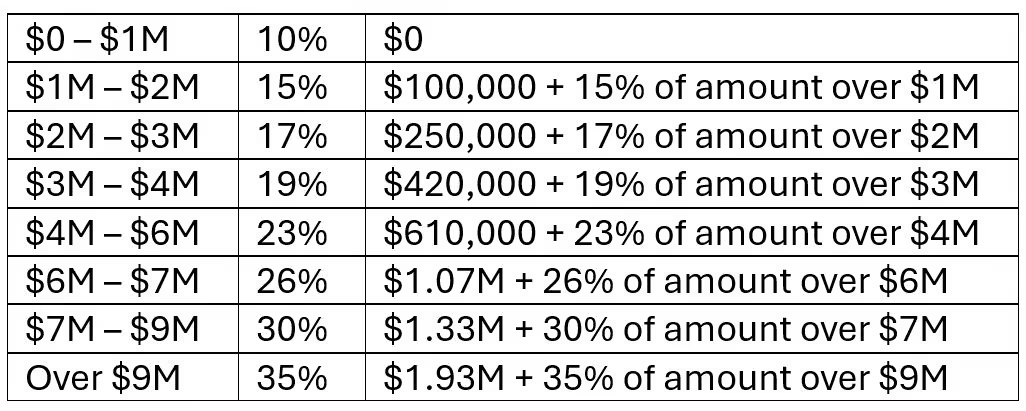Big Changes Coming to Washington Estate and Capital Gains Taxes
%2520(70).avif)
%2520(70).avif)
Special Edition: Big Changes Coming to Washington Estate and Capital Gains Taxes
In April 2025, Washington State passed ESSB 5813, a major new law that changes how both estate taxes and capital gains are taxed in the state. These changes go into effect in mid-2025 and early 2026, and they carry important implications for individuals, families, and business owners.
In this special edition blog, we’ll break down:
- 🏛️ Changes to the Washington estate tax
- 💸 New capital gains surtax
- 📊 Real examples to show how your tax bill may be affected
Let’s take a closer look at what’s changing—and what you should consider doing now to plan ahead.
🏛️ Estate Tax Changes in Washington
Effective Date: July 1, 2025
Key Updates:
- The estate tax exemption increases from $2.193 million to $3 million.
- New progressive brackets introduce higher marginal tax rates, including a new top rate of 35% (up from 20%).
Washington already had one of the most aggressive state-level estate taxes. This law raises both the exemption and the top rate, leading to mixed results depending on the size of the estate.
📊 Updated Washington Estate Tax Brackets (Effective July 1, 2025)
Washington Taxable Estate Tax Rate Base Tax + Rate Applies To Amount Over

💡 Estate Tax Examples
Example 1: $5 Million Estate
Before July 1, 2025:
- Exemption = $2.193M
- Taxable estate = $2.807M
- Tax owed ≈ $361,050
After July 1, 2025:
- Exemption = $3M
- Taxable estate = $2M
- Tax owed = $250,000
✅ Result: Lower tax burden thanks to the higher exemption.
Example 2: $10 Million Estate
Before July 1, 2025:
- Exemption = $2.193M
- Taxable estate = $7.807M
- Tax owed ≈ $1,257,365
After July 1, 2025:
- Exemption = $3M
- Taxable estate = $7M
- Tax owed = $1,330,000
❗ Result: Higher tax burden due to increased marginal rates.
💸 Capital Gains Tax Changes
Effective Date: January 1, 2025 (for taxes due in 2026)
Key Updates:
- The existing 7% Washington capital gains excise tax remains.
- A new 2.9% surtax applies to capital gains over $1 million per individual.
- The total top state-level capital gains tax is now 9.9%.
⚠️ When Does the Tax Apply?
The Washington capital gains tax applies when gains are realized—meaning you sell or dispose of an asset and recognize a profit. It does notapply to unrealized gains (assets you still hold that have increased in value but haven’t been sold).
💡 Capital Gains Example
Suppose an individual sells stock in March 2025 and realizes a $2 million gain.
Here’s what they would owe under Washington law:
- First $1M of gain → 7% = $70,000
- Next $1M of gain → 9.9% = $99,000
- Total WA capital gains tax = $169,000
If the sale occurred in 2024, only the 7% tax would apply—so timing matters.
Note: This surtax does not apply to entities, only individuals. And most real estate, retirement accounts, and certain qualifying small business sales are still excluded.
🧭 What Should You Do Now?
If you:
- Have an estate valued at $3 million or more
- Plan to sell a business or investments soon
- Want to protect your family from unnecessary tax burdens…
…it’s time to revisit your estate plan and tax strategies. These changes increase both the urgency and opportunity to plan ahead.
🤝 We’re Here to Help
At Dolev Law, we help Washington and Oregon families and business owners navigate estate and tax planning with clarity and care.
🗓️ Schedule your free discovery call today to talk through your estate or asset sale plans and explore proactive strategies tailored to you.
This article is a service of Dolev Law, a Personal Family Lawyer® Firm. We don’t just draft documents; we ensure you make informed and empowered decisions about life and death, for yourself and the people you love. That's why we offer a Life & Legacy Planning Session,Ⓡ during which you will get more financially organized than you’ve ever been before and make all the best choices for the people you love. You can begin by calling our office today to schedule a Life & Legacy Planning Session.
The content is sourced from Personal Family Lawyer® for use by Personal Family Lawyer® firms, a source believed to be providing accurate information. This material was created for educational and informational purposes only and is not intended as ERISA, tax, legal, or investment advice. If you are seeking legal advice specific to your needs, such advice services must be obtained on your own separate from this educational material.


%2013.35.28.png)

.jpg)

